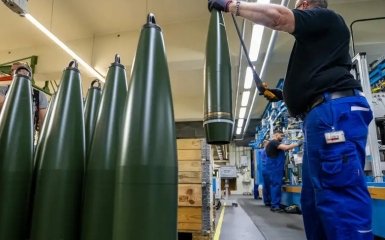EU countries faced problems in the implementation of the plan to increase the production of artillery ammunition to provide aid to Ukraine.
What stands in the way of EU ammunition production increasing for transfer to Ukraine
It is noted that in January of this year, the EU countries admitted that they did not fulfil their promise to transfer one million artillery pieces of ammunition to Ukraine.
In March, Brussels allocated 500 million euros to increase ammunition production.
However, an unexpected problem was the lack of explosives.
In particular, the approved plan envisages that about 372 million euros will be directed to ammunition manufacturers.
Europe needs explosive materials to meet its target of producing two million rounds a year by the end of 2025.
The EU is facing an acute shortage of explosives. How to solve the problem
The authors of the material explain that each artillery shell contains 10.8 kg of high explosives, such as TNT, octogen or hexane.
Additional charges are needed to propel shots tens of kilometres.
Other munitions require even more explosives.
For example, the high-explosive warhead of the Storm Shadow missile weighs about 450 kg.
The publication notes that explosives manufacturers lack confidence that the approved plan to increase ammunition production will be implemented.
The authors emphasise that with the end of the Cold War, the demand for weapons fell sharply, forcing many European explosives manufacturers to curtail their activities.
The UK, for example, closed its last plant for explosive production in 2008.
The last large producer of TNT in Europe is located in the north of Poland.
In other countries, many state facilities were either privatized or mothballed.
For decades, the production of explosives and artillery ammunition in the EU countries was oriented towards peacetime needs.
As a result, minimal reserve is left in the supply chain to meet the growing demand.
It is emphasised that in European countries, several manufacturers produce high-energy materials according to NATO standards.
One is Chemring Nobel, which has a large plant in Setra, Norway.
Another company is France's Eurenco, which operates an equally massive facility in Karlskog, Sweden.
By 2030, the Eurenco plant will be overloaded, while the Chemring plant in Saetra will operate at full capacity.
According to Tim Lawrenson of the International Institute for Strategic Studies, modernizing and repairing the production lines will take some time to increase the production of artillery munitions and restore the operations of factories that have ceased operations.
European defence companies, attracted by ASAP subsidies, are investing in expanding production.
However, according to specialists, building an enterprise from scratch can take three to seven years.
Case in point: Munitions supplier Rheinmetall is building an explosives complex in Hungary; however, production will not begin until 2027.
A large number of safety and environmental regulations also hamper plans to expand production, it said.
Some European munitions suppliers are currently sourcing explosives from companies in Japan and India.
Some experts are concerned that imported explosives are of the worst quality and can, therefore, damage equipment.
Annual EU-wide projectile production is projected to reach at least 1.4 million by the end of 2024, up from around 500,000 a year ago.
French President Emmanuel Macron defended the effectiveness of France's "war economy" as he laid the first brick for the Eurenco fuel plant in Bergerac on April 11.
According to him, the plant will be opened in a record time by 2025. However, since Russia's summer offensive is already in full swing, this is not enough to help Ukraine, the publication emphasises.




